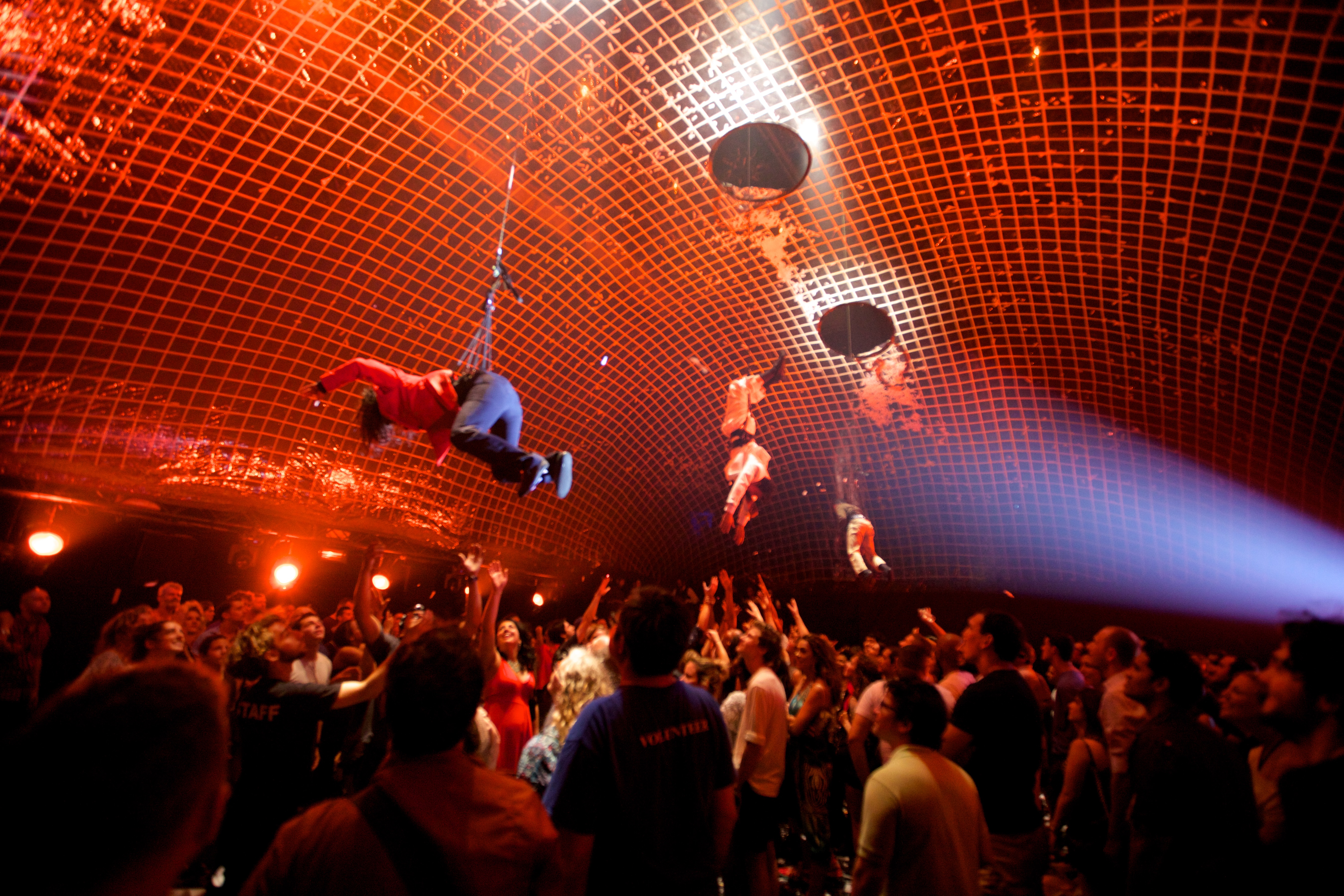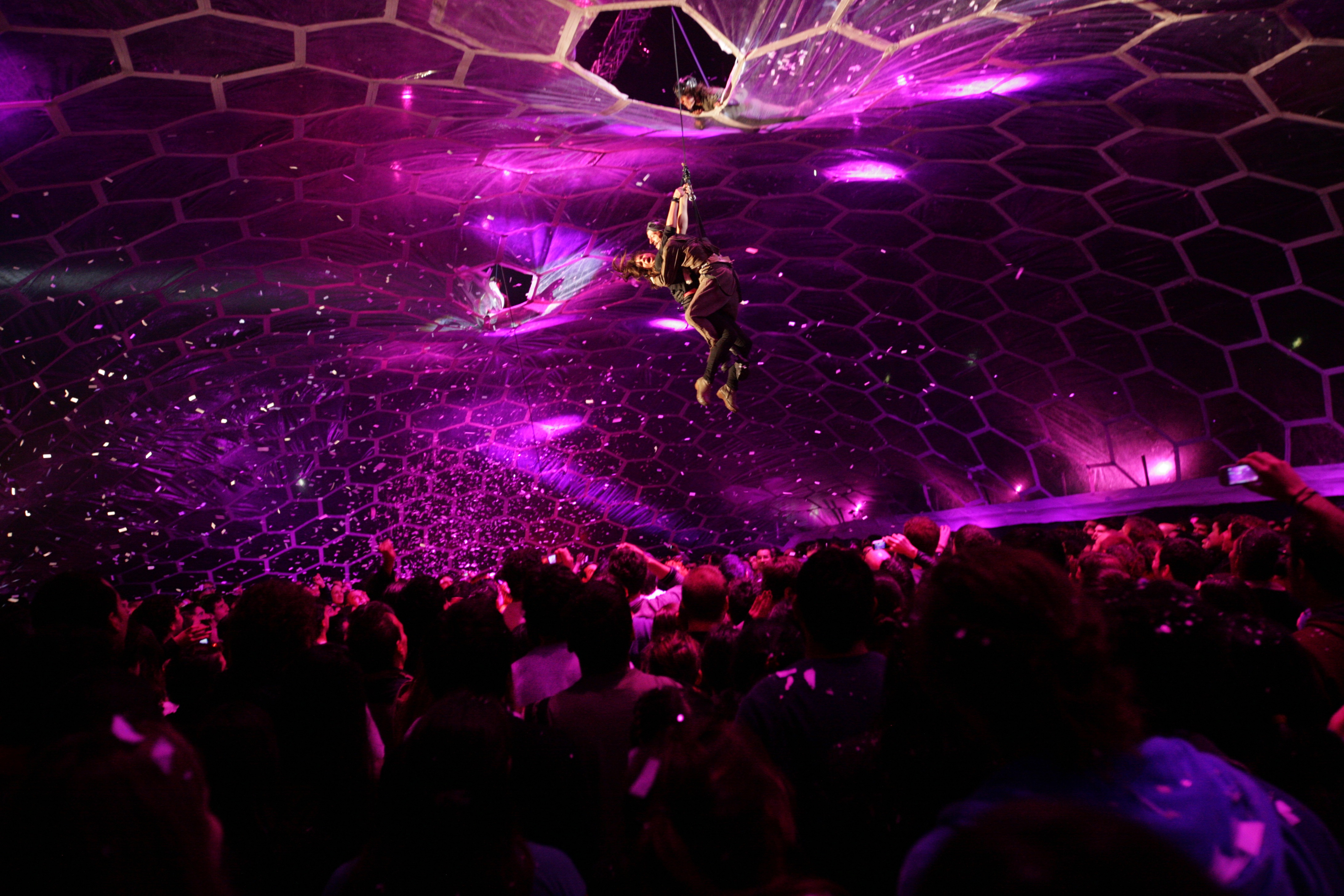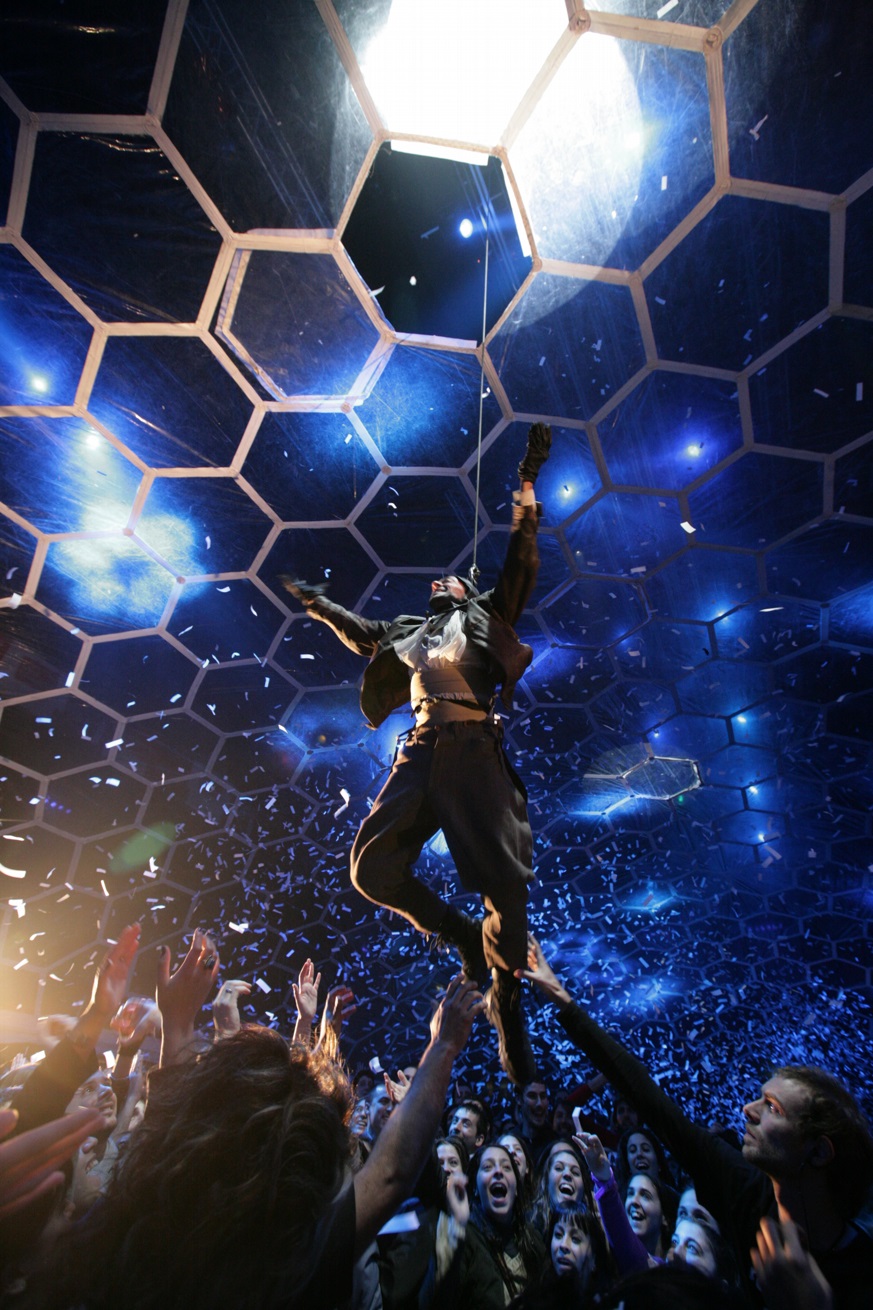People don’t often link rain, wind, ropes, treadmills, tribal drums, and overhead plexiglass pools to live theater, but thanks to the ingenuity of Argentinian director Diqui James, all of these elements combine into a 90 minute experience called Fuerza Bruta.
Earlier this month, the show celebrated its’ 10 year global anniversary. During that time, 5 million spectators in over 25 countries and 45 cities experienced this hypnotic jolt to the senses.
Since 2007, New York audiences have flooded the former, cavernous bank space at the Daryl Roth Theater in Union Square to see this non-traditional performance piece. Recently, Fuerza Bruta has added new projections and has teamed with Webster Hall to continue a Friday night dance party immediately following the late night performance.
To describe the production in words is to undermine it, as it is a show that demands participation rather than explanation. Manhattan Digest caught up with co-creator and Artistic Director James to discuss the show’s construct and the the cultural impact it has made around the world.
MD: Where did the idea for this show evolve?
DJ: It’s not easy to understand where the ideas came from, but the initial concept came from wanting the audience “inside” the show and to not use a traditional stage with seating. We wanted it to be more of a street theater or carnival or something celebratory.

MD: As I left the show, I couldn’t stop thinking about some of the scenes, particularly the one where a man is trying to crawl down a huge plastic tube while air is simultaneously being blown up the tube. Where did ideas like that come from?
DJ: (Laughs). We work as a team to make these things happen, but I don’t necessarily think of them as “ideas” so much as “impulses”. Ideas are more intellectual and metaphorical. I just want the audience to experience the action of running and crushing things and going through everything. Maybe now, after 10 years I can say that the world is moving and we have to move with it, but the origin is simply a feeling. It’s not really conceptual or trying to make a specific statement.

MD: Maybe I overthought it then? My interpretation was that the show symbolizes the disorganization and chaos of life, but maybe that was misguided?
DJ: No, No. It can mean something different for everyone, but I believe that if you start to overthink the concept, you lose the feeling. I have a problem when people over-analyze theater and think that it must have intellect and a lot of words. There is too much overthinking and Fuerza Bruta is far away from that. We believe in theater as a big celebration and that is something primitive.
MD: That is really a testament to why it has become such a global phenomenon; It can speak a language without speaking any specific language.
DJ: Yes. And I think that comes from a place of wanting to bridge cultural and economic classes. In Argentina (and around the world, really), we have a lot of differences between those who have money and those who don’t, those who can read and those who can not. From the time I was a teenager, I knew I wanted to do the type of theater that anyone can understand, not just the type that those reading Shakespeare would like. This is why the show has been so successful around the world; we have crossed cultural boundaries. We didn’t think we were doing something exclusively Argentinian when we started. We just thought we were doing something f—-ing crazy that had nothing to do with our country. Whether we are in Japan, Mexico, Korea, or India we see people, for the most part, understand perfectly what the show is all about.
MD: In the 10 years of bringing this show to a global audience, by now you have probably anticipated the audience reaction. Have there been any performances where you’ve been shocked by their reaction in a positive or negative way?
DJ: Not shocked, but there have been challenges. For instance, when we played in China last year, it was the first time that many of them had seen a show that was not Chinese and they didn’t know what to make of it. So we had to add some clues to indicate that it was okay to move and shout and clap. But in places like Argentina or Brazil or here in New York, people don’t really need any explanation to become part of the craziness!

MD: There is a tremendous amount of strength and stamina required by the performers and I’m wondering what training you need in order to be a part of this show?
DJ: Years ago, there wasn’t a culture of being physically fit. Actors were people who just stood on a stage and read lines or appeared in movies. Nowadays, it is hard to find a young actor who is not already physically fit. Everybody takes turns doing all of the roles in the show, so that is a great way to make it fun and keep it fresh for everyone.
MD: The music in the show ranges from a quiet, ethereal calm to tribal, raucous, party music. Where did the musical inspiration come from?
DJ: Gaby Kerpel, the composer, and I have worked together for 25 years. We understand each other. When I first started working with him, our meetings would be 4 hours. Now, we meet for 15 minutes because we just “get” each other. He is really into Native South American music. He works a lot with those sounds. The funny thing is that he is a small, calm guy and I often wonder where he comes up with this crazy music!

MD: What’s next for you and Fuerza Bruta? I assume you’ll continue the NYC show as long as people are coming, but do you have any other projects in the works?
DJ: Oh yes. We are touring this show in Asia, South America, and Europe and at the same, we are developing things for the street and festivals. We have a big outdoor event in Hungary, Budapest during an art and music festival. We are doing a 20 minute outdoor show five times a day. I like the controlled box experience of traditional theater, but I also love to be “out there” and create an atmosphere where people can become involved in all of the craziness! We are talking about some outdoor opportunities here in New York, and I hope that this year it happens.
Fuerza Bruta continues at the Daryl Roth Theatre (101 E. 15th Street). Tickets are available online or at the box office. $20 cash only rush tickets are also available at each performance. For more information, visit: http://www.fuerzabrutaNYC.com. For a sneak peek at the fun, check out: https://www.youtube.com/watch?v=8SvN4miHo3s
